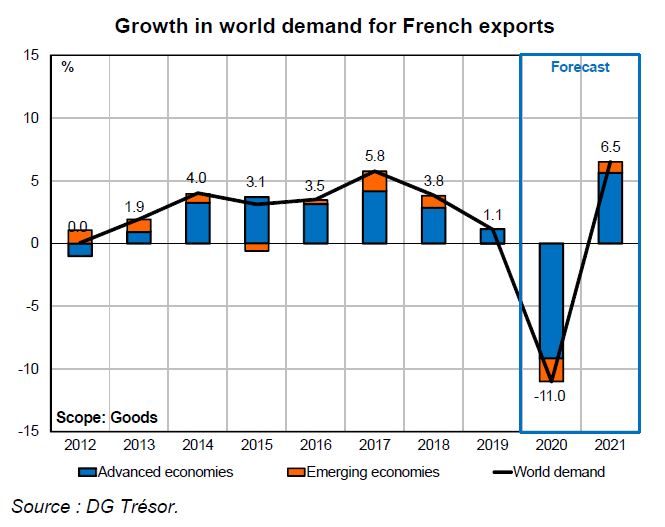World economic outlook in autumn 2020: What sort of recovery after the record economic decline?
The covid-19 epidemic and associated containment measures would result in a historic decline in global activity by 2020. Emerging economies would catch up by the end of 2021 to their 2019 level of activity, unlike advanced economies, where the rebound would be more limited. The decline in trade would be even more pronounced. Developments in the epidemic, the productive fabric, the labor market, and protectionism make this scenario particularly uncertain.
Global growth is forecast to contract sharply by 4.1% in 2020, on the back of the COVID-19 epidemic and lockdown measures, after slowing to 2.9% in 2019. It is subsequently projected to rebound to 5.2% in 2021, on the assumption that health situation will ease gradually. Emerging economies as a whole are expected to return to their 2019 level of activity by the end of 2021. Advanced economies, by contrast, are likely to experience a deeper shock and a slower recovery.
In the euro area, economic activity is forecast to decline by a record 7.9% in 2020 due to the severity of the epidemic in the first half of the year. Activity is expected to increase by 6.3% in 2021, but is unlikely to return to pre-COVID-19 levels. The recovery is projected to be uneven across the euro area: Germany is expected to record a smaller hit to activity (a cumulative decline of 1.8%) than Spain (–4.6%) or Italy (–5.0%).
The UK is predicted to report a sharp contraction in activity in 2020 (–10.5%), owing to the severity of the epidemic and the duration of containment measures, which are also expected to hinder the recovery in 2021, in addition to Brexit. Activity in the United States is likely to slow to a lesser extent than in Europe in 2020 (–5.2%) because of less strict lockdown measures, but the recovery is expected to be constrained in 2021 (+3.0%) by private debt (which would affect bankruptcies and the labour market) and uncertainties around the health situation. In China, growth is projected at 1.5% in 2020 – its slowest pace on record – with the country's highly accommodative economic policy driving a recovery as early as in the second quarter of the year despite the collapse in the first quarter.
The slump in activity is expected to spur a sharp contraction in global trade in 2020 (–10.0%). World trade is projected to rebound only partially in 2021, growing by 6.1%, and look set to suffer the lasting effects of a partial recovery in advanced economies and protectionist policies that restrict trade.
This scenario is subject to considerable uncertainty. The recovery in activity will depend on how the epidemic evolves, to what extent the manufacturing base can be preserved, whether the labour market will normalise, and how trade tensions pan out – all sources of uncertainty.
